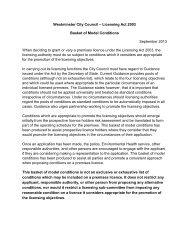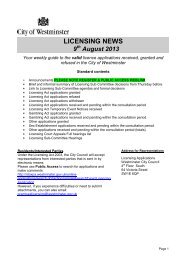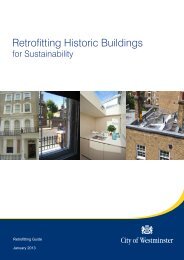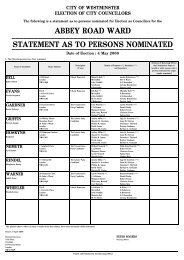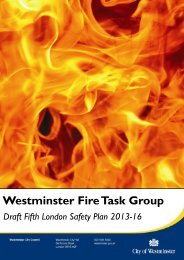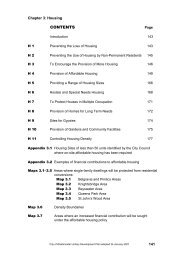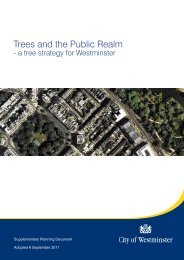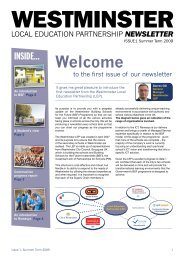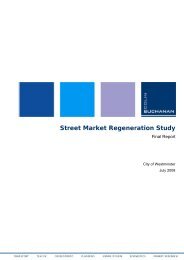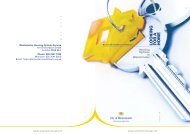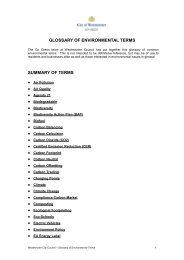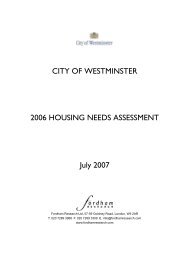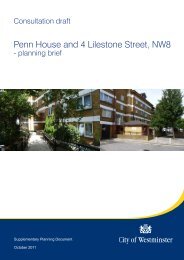Amended guidance issued under section 182 of the Licensing Act ...
Amended guidance issued under section 182 of the Licensing Act ...
Amended guidance issued under section 182 of the Licensing Act ...
You also want an ePaper? Increase the reach of your titles
YUMPU automatically turns print PDFs into web optimized ePapers that Google loves.
POWERS OF A LICENSING AUTHORITY ON THE DETERMINATION OF A REVIEW11.17 The 2003 <strong>Act</strong> provides a range <strong>of</strong> powers for <strong>the</strong> licensing authority which it may exerciseon determining a review where it considers <strong>the</strong>m appropriate for <strong>the</strong> promotion <strong>of</strong> <strong>the</strong>licensing objectives.11.18 The licensing authority may decide that <strong>the</strong> review does not require it to take any fur<strong>the</strong>rsteps appropriate to promote <strong>the</strong> licensing objectives. In addition, <strong>the</strong>re is nothing toprevent a licensing authority issuing an informal warning to <strong>the</strong> licence holder and/or torecommend improvement within a particular period <strong>of</strong> time. It is expected that licensingauthorities will regard such informal warnings as an important mechanism for ensuring that<strong>the</strong> licensing objectives are effectively promoted and that warnings should be <strong>issued</strong> inwriting to <strong>the</strong> licence holder.11.19 However, where responsible authorities like <strong>the</strong> police or environmental health <strong>of</strong>ficers havealready <strong>issued</strong> warnings requiring improvement – ei<strong>the</strong>r orally or in writing – that have failedas part <strong>of</strong> <strong>the</strong>ir own stepped approach to address concerns, licensing authorities shouldnot merely repeat that approach and should take this into account when considering whatfur<strong>the</strong>r action is appropriate.11.20 Where <strong>the</strong> licensing authority considers that action <strong>under</strong> its statutory powers isappropriate, it may take any <strong>of</strong> <strong>the</strong> following steps:• to modify <strong>the</strong> conditions <strong>of</strong> <strong>the</strong> premises licence (which includes adding new conditions orany alteration or omission <strong>of</strong> an existing condition), for example, by reducing <strong>the</strong> hours <strong>of</strong>opening or by requiring door supervisors at particular times;• to exclude a licensable activity from <strong>the</strong> scope <strong>of</strong> <strong>the</strong> licence, for example, to exclude <strong>the</strong>performance <strong>of</strong> live music or playing <strong>of</strong> recorded music (where it is not within <strong>the</strong> incidentallive and recorded music exemption);• to remove <strong>the</strong> designated premises supervisor, for example, because <strong>the</strong>y consider that <strong>the</strong>problems are <strong>the</strong> result <strong>of</strong> poor management;• to suspend <strong>the</strong> licence for a period not exceeding three months;• to revoke <strong>the</strong> licence.11.21 In deciding which <strong>of</strong> <strong>the</strong>se powers to invoke, it is expected that licensing authoritiesshould so far as possible seek to establish <strong>the</strong> cause or causes <strong>of</strong> <strong>the</strong> concerns that <strong>the</strong>representations identify. The remedial action taken should generally be directed at <strong>the</strong>secauses and should always be no more than an appropriate and proportionate response.AMENDED GUIDANCE ISSUED UNDER SECTION <strong>182</strong> OF THE LICENSING ACT 200393



